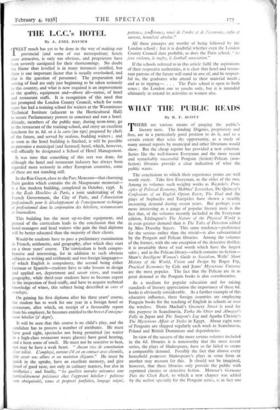THE L.C.C.'s HOTEL
By A. EMIL DAVIES
V HAT much has yet to be done in the way of making our 1 provincial (and some of our metropolitan) hotels more attractive, is only too obvious, and proprietors have been severely castigated for their shortcomings. No doubt The blame thus levelled is in many instances justified, but there is one important factor that is usually overlooked, and that is the question of personnel. The preparation and serving of food are only just beginning to be taken seriously in this country, and what is now required is an improvement in the quality, equipment and—above all—status, of hotel and restaurant staffs. It is recognition of this need that has prompted the London County Council, which for some vears has had a training school for waiters at the Westminster Technical Institute (adjacent to the Horticultural Hall) to secure Parliamentary powers to construct and run a hotel. Already, members, of the public may, during term-time, go to the restaurant of the training-school, and enjoy an excellent luncheon for 25. 6d. or a la carte (no tips) prepared by chefs of the future, and served by zealous, budding waiters ; and as soon as the hotel building is finished, it will be possible to patronise a municipal (and licensed) hotel, which, however, will officially be designated a School of Hotel Management.
It was time that something of this sort was done, for although the hotel and restaurant industry has always been regarded more seriously in other European countries, some of these are not standing still.
In the Rue Guyot, close to the Parc Monceau—that charming Paris garden which contains the de Maupassant memorial— is a fine modern building, completed in October, 1936. It is the Ecole Hoteliere de Paris, a joint undertaking of the French Government, the City of Paris, and ?Association professionelle pour le developpement de l'enseignement technique et professionnel dans la corporation des hoteliers, restaurateurs et limonadiers.
This building has the most up-to-date equipment, and perusal of the curriculum leads to the conclusion that the hotel-managers and head waiters who gain the final diploma will be better educated than the majority of their clients.
Would-be students have to pass a preliminary examination in French, arithmetic, and geography, after which they start on a three years' course. The-curriculum is both compre- hensive and interesting, for in addition to such obvious subjects as writing and arithmetic and two foreign languages— of which English is compulsory, the second being either German or Spanish—students have to take lessons in design and applied art, deportment and savoir vivre, and tourist geography, while third-year students have to become expert in the inspection of food-stuffs, and have to acquire technical knowledge of wines, this subject being described as cave et oerzologie.
On gaining his first diploma after his three years' course, the student has to work for one year in a foreign hotel or restaurant, after which, on receipt of a favourable report from his employer, he becomes entitled to the brevet d'enseigne- men! hotelier (2° degre).
It will be seen that this course is no child's play, and the candidate has to possess a number of attributes. He must have good sight, spectacles not being permitted (no waiter in a high-class restaurant wears glasses) have good hearing, and a keen sense of smell. He must not be sensitive to heat, nor may he have a weak heart. " Aucun vice de constitution ;fest tolere. L'employd, surtout s'il est en contact avec clientele, doit avoir une allure et un maintien elegants." He must be quick in the uptake, have an excellent memory, and give proof of good taste, not only in culinary matters, but also in aesthetics ; and finally, " les qualitis morales suivantes sont particulierement precieuses chez l'apprenti hotelier : politesse sans obsequiosite, tenue et proprete parfaites, langage soigne, patience, temfierance, souci de l'ordre et de l'economie, enfin ct surtout, honnetete absolue."
All these precepts are worthy of being followed by the London school ; but it is doubtful whether even the London County Council dare prohibit, as does the Paris school, "it's jeux violents, le rugby, le football association."
If the schools referred to in this article fulfil the aspirations of their respective authorities, it is clear that hotel and restau- rant patrons of the future will stand in awe of, and be respect- ful to, the graduates who attend to their material needs ; and as to tipping—. . . . The Paris school is open to both sexes ; the London one to youths only, but it is intended ultimately to extend its activities to women also.














































 Previous page
Previous page